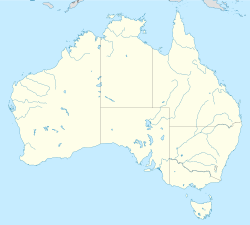This article is an orphan, as no other articles link to it. Please introduce links to this page from related articles; try the Find link tool for suggestions. (October 2024) |
Gailes Airfield (also known as Wacol or A-9) was an Emergency Landing Ground built in 1942, Wivenhoe Hill, Queensland, Australia.
| Gailes Airfield | |
|---|---|
| Wivenhoe Hill, Queensland in Australia | |
| Coordinates | 27°22′11″S 152°33′35″E / 27.36972°S 152.55972°E |
| Type | Emergency Landing Ground |
| Site information | |
| Owner | Australian Defence Force |
| Operator | Royal Australian Air Force |
| Site history | |
| Built | May 1942 |
| Built by | Hornibrook |
| In use | 1942 - 1944 |
| Constructed for the American military, but never reported to be used by the RAAF. | |
History
editIn May 1942, Gailes Airfield was constructed by Brisbane based contractor Hornibrook for the American military, however it was never reported to be used by the Royal Australian Air Force (RAAF).[1] The airfield was built with a hangar and camouflaged hideouts. The airfield was also under control by the RAAF, and was designated as a B-1 type airfield which means it had one runway greater than 800 yards long. In August 1943, a detailed RAAF inspection reported a cleared and graded runway which was unusable due to the growth of plant suckers and log barricades, which was removed in September 1943. However, in May 1944, a large 7.6m wide and 3m deep hole existed in the centre of the strip.[2][3]
Adjacent to the airfield was the Darra Ordnance Ammunition Depot, built by the Thiess Brothers in the 1940s.[1]
Closure
editAccording to a U.S. report in April 1944, the project was abandoned after preliminary work, was declared open land, and that nearby facilities had since ceased operations. The suburb of Carole Park was built over the site of the airfield, and no trace remains.[2]
References
edit- ^ a b "Gailes Emergency Landing Ground". Camp Columbia. 23 June 2024. Retrieved 27 October 2024.
- ^ a b "Gailes Airstrip". Anzac Square. Retrieved 27 October 2024.
- ^ "Gailes Emergency Landing Ground". Oz at War. Retrieved 27 October 2024.
